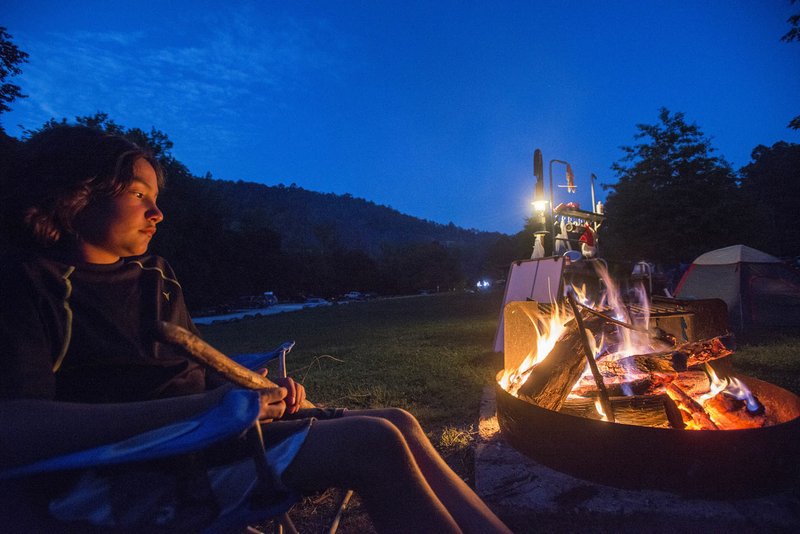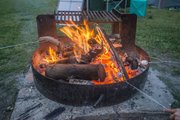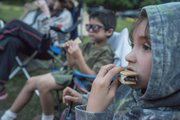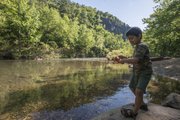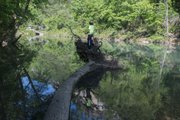Editor's note: Camping season is here, and each spring families and individuals embark on their first camping adventure. Here are tips offered by readers and by other experienced campers.
The list first ran in May 2014, but new tips have been added for this edition.
Happy camping.
• If you use an inflatable sleeping pad or mattress, have a patch kit for it. Kits go for about $10, but you'd give $100 when you need one.
• Use a tent's ground cloth properly. Make sure it's not sticking out past your tent's floor foot print. Otherwise you have created a bowl to collect rain water under your tent. Not good.
• If you use a battery-operated pump to inflate an air mattress, flip one of the batteries upside down so the pump doesn't accidentally come on and drain the batteries.
• Keep duct tape and parachute cord in your camp kit. Both have many uses in camp.
• Assemble a basic first-aid kit and inspect it each year. A small sewing kit is also good to have.
• Most campgrounds don't have receptacles for recycling. Be prepared to bring your recyclables home.
• Ladies, suggest that your significant other plan the meals and cook when camping, since it is usually the other way around at home.
• Don't take a radio. No one wants to hear your personal preference of amplified noise.
• Camp during the week if possible. Campgrounds are almost always crowded on the weekend.
• Pack similar items together in zipper bags. Squeezing the air out of the bags saves space.
• Don't feel like you need a scheduled activity to fill every minute of the day. Relax and enjoy.
• It's better to have it and not need it than not have it, so tend to pack on the heavy side.
• Pack light. Make a gear list and add or delete items for efficient packing. Double check the list before you leave.
• Keep a pair of channel-lock pliers in your kitchen gear. They're great for lifting hot pots.
• Take a shovel. It's handy for spreading hot coals beneath a cooking grate.
• Take leather gloves. Yes, that coffee pot or skillet on the campfire is hot.
• Plastic jars with tight lids make small, ideal waterproof containers for canoe camping.
• Take two lighters. One to use and one to lose.
• Pack sunscreen, insect repellent, hand lotion and lip balm in your kit.
• Soy milk keeps much longer in a cooler than dairy milk. It can be used like dairy milk in any recipe.
• Don't scatter your ice in the cooler. Separate the ice into two to four zipper bags. The ice will last longer and items in the cooler won't get wet.
•Rinse plastic milk jugs, fill three-fourths full of water and freeze. Use these instead of bagged ice in your cooler. The ice becomes ice-cold drinking water as it melts.
• Put coolers and trash inside your car before going to bed. Critters can't bother them there.
• Store your camping gear in a little-used room at home, like a formal dining room or spare bedroom, preferably close to a door. It will make packing and unpacking easier.
• A portable camp table is handy for camping at any site that lacks a picnic table.
• Pack only a couple of changes of clothes. You end up wearing the same clothes for a few days at a time. If they smell like campfire smoke, so much the better.
Camping with kids
•Before taking kids on their first camping trip, schedule a night or two sleeping in the back yard. This will help children gain confidence in the tent, sleeping bags and sleeping outdoors.
• When camping with kids, it's important to leave your campsite cleaner than you found it. When a child sees a parent picking up trash someone else has left, it teaches a lasting lesson about taking care of the environment.
• Involve the kids in planning and preparing. Kids learn important life skills when studying maps, preparing food and selecting their own clothing to take.
• Taking young children camping can be a challenge at times, but as they get older and learn to appreciate the natural wonders, they're more likely to become good stewards of the environment. Get kids outdoors.
• Take cards, board games or (gasp!) computer games to keep kids occupied if it rains.
• With kids, let the night's campfire die gradually as bedtime nears. It's a subliminal signal for them to get sleepy. This works best if you don't pump them full of 15 high-sugar s'mores and three caffeine energy drinks.
• A campsite near water is great for kids. They can keep themselves amused for hours along a creek bank or lake shore.
More campsite tips
• Sleep with the same number of pillows when you camp as you do at home.
• Make meal components ahead of time and freeze. They help cool the ice chest and last longer inside.
• Cut re-bar into 16-inch lengths or longer to make industrial-strength tent stakes. Make a bend at the top of each stake so it has an L or J shape. They aren't light but sure hold on blustery days
• Schedule your first camping trip or two with experienced campers. You'll learn from them, see what gear they use and what you'll need to camp on your own.
• If you can, go it alone. Hiking into the forest and experiencing the sights and sounds without a crowd of people around is an experience that will astound and resound you.
• Tacos are an easy camp dinner. Cook chicken or beef and chop veggies at home. Store in zipper bags for an easy camp meal.
• Always pack rain gear, even when rain isn't expected.
• Save lint from your clothes dryer. It makes great fire starter.
Sports on 05/24/2016

